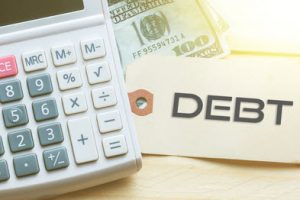3 Dischargeable Debts In Bankruptcy

In the words of several Supreme Court Justices, the Bankruptcy Code is designed to give the “honest but unfortunate debtor” a fresh start. This label applies to almost all the voluntary bankruptcy petitioners in Illinois and Indiana. Since it would be impossible to get this fresh start with unpaid accounts still hanging over the debtor’s head, most all unsecured debts are dischargeable. “Unsecured debts” are those that include only a promise to pay and are not secured by property, such as a house or car.
That being said, there are some restrictions and limitations on discharge, or forgiveness of debt.
Medical Bills
The leading cause of consumer bankruptcy filings is also the classic example of unsecured and dischargeable debts. Because they are usually involuntary (no one asks to get seriously ill), many moneylenders are also a little more understanding about medical bill-related bankruptcies, especially if the debtor has a reasonably good credit history otherwise.
Bankruptcy ends the obligation to repay the debt but not the medical debt itself. That’s normally a good thing, because many medical creditors are willing to accept a partial payment post bankruptcy and notate the debt as “paid,” because they know that a partial payment is much more than they are likely to get otherwise. Such a note helps improve the debtor’s credit score and also demonstrates additional financial diligence to other potential creditors.
Credit Cards
Rising interest rates are just one reason that credit card debt now eclipses $16,000 per household. Now that the Great Recession is in the rearview mirror for most people, they have more confidence and are spending more. Unfortunately, many of us spend money that we do not have, and that sometimes leads to bankruptcy filings.
The automatic stay often comes into play with regard to credit card debt, because these moneylenders are normally quick to file suit over delinquent accounts. Under Section 362, all these lawsuits must stop at the moment the debtor files a voluntary petition, at least in most cases. Furthermore, since the discharge order eliminates the obligation to repay the credit card, the lawsuit cannot be revived.
Taxes
Past due state and federal income taxes are both dischargeable in bankruptcy, provided that the following conditions are met:
- – The tax must be at least three years old,
- – The returns must have either been filed on time or at least been on file for a minimum of two years, and
- – The debt has not been assessed in the last 240 days (in plain English, that usually means the taxpayer has not received a collections notice in the last nine months).
Bankruptcy only discharges past-due tax debt and not any tax debt associated with fraud or willful evasion. Furthermore, if the taxing authority has filed a lien, that lien remains in place, because the bankruptcy judge only has the power to extinguish the legal obligation to repay the debt.
Some unsecured debts are not dischargeable for policy reasons, such as family support obligations (FSOs). However, the automatic stay still applies, so bankruptcy will stop FSO-related lawsuits and wage garnishment.
Reach Out to Experienced Attorneys
Most people emerge from Chapter 7 or Chapter 13 bankruptcy with no unsecured debt. For a free consultation with an experienced bankruptcy attorney in Chicago, contact the Bentz Holguin Law Firm, LLC. Convenient payment plans are available.
Resources:
usatoday.com/story/money/personalfinance/2017/05/05/this-is-the-no-1-reason-americans-file-for-bankruptcy/101148136/
time.com/money/4607838/household-credit-card-debt/


